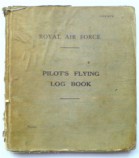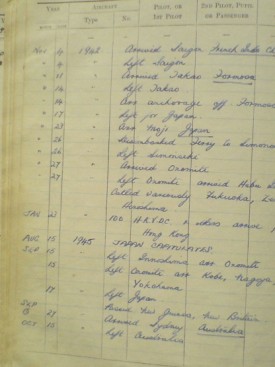Terence Kelly - FEPOW
Terence Kelly – Far East Prisoner of War 1942 - 1945
Terence was a fellow WWII – Far East Prisoner of War of Albert Ient's, 1942 - 1945, at Habu Camp (Hiroshima Camp 5), Hitachi Dockyard, Innoshima, Japan.
My continuing search for information about what happened to my father during the Second World War was greatly helped when I was given the opportunity, through working for Ericsson, to go to China, and on the way back I went to Hong Kong. Hong Kong was a significant part of my parent's life, and of course that is where Dad was captured. When I returned, I carried on my research and, through my brother John, I discovered the work of Terence Kelly.
I hope you find this real life story interesting. Please follow these links to go to the section of interest:
About Terence
Meeting Terence Kelly
Capture
Internment and Journey from Java to Japan
Hiroshima Camp 5
Camp Working Life
Punishment
Malnutrition
Prisoner of War Letters
Red Cross Parcels
American Bombing
Atomic Bomb – Hiroshima
Conditions Get Worse
The End of the War
The British Navy Arrive in the Innoshima Sea
Returning Home – First Through Japan
Journey from Japan to Australia
Thanks
See also the articles on this web site titled:
Hiroshima #5 Prisoner of War Camp
Conditions and Routines in Hiroshima #5 PoW Camp
Albert Ient (also a FEPOW in the same Japanese camp)
Maynard Skinner (also a FEPOW in Japan )
WWII – Far East
About Terence
After flying Hurricanes against the Japanese in Singapore, Sumatra and Java, Terence was taken prisoner in early 1942. For seven months he was held in Boei Glodak, a squalid native prison, before being transported to Japan with more than 1,000 fellow POWs, in the ancient freighter Dai Nichi Maru. When he arrived in Japan, he was taken to Habu, the principal township on Innoshima Island, and a prisoner of war camp named Hiroshima #5.[1] From this camp he went daily to work in the Hitachi Dockyard – just as my father did.
After the war, Terence became a quantity surveyor and set up offices in London and the Caribbean handling many different projects. His experiences led him to write his first novel, The Carib Sands, and persuaded him to become a full-time author. His first play, A Shake in the Sun, went to the West End and many more novels and plays for stage, television and radio followed. In addition, Terence has written a number of non-fiction books, including, By Hellship to Hiroshima which is the up-dated version of Living with the Japanese. Both of these books vividly describe his experiences as a Far East prisoner of war and, of particular interest to me, what life was like in Hiroshima Camp 5, including his relationship with his captors and men from the Hong Kong Volunteer Defence Corps and work in the large Hitachi shipyards.
Terence Kelly died in September 2013.
Meeting Terence Kelly
 In March of 2007, I was privileged to meet Terence at his home in Marlow. We talked about many things relating to his captivity and possible connections with my father's experiences. For instance, the incident both men recalled was when a request to go swimming was agreed to and they were marched into the freezing cold sea, in the dark at night; and their mutual friendship with Geoffrey Coxhead, the English artist and diarist. The following notes are a record of that discussion.[2]
In March of 2007, I was privileged to meet Terence at his home in Marlow. We talked about many things relating to his captivity and possible connections with my father's experiences. For instance, the incident both men recalled was when a request to go swimming was agreed to and they were marched into the freezing cold sea, in the dark at night; and their mutual friendship with Geoffrey Coxhead, the English artist and diarist. The following notes are a record of that discussion.[2]
Capture
Terence started by talking about the capitulation of Java (part of which was Netherlands East Indies, modern day Indonesia) by the Dutch and his subsequent capture. It was obvious that he still had some reservations about the necessity of this drastic action. He said:
"Well, what I mean is that the invasion force of Japanese was so modest, that any real effort to fight against them – in a country of 60 or 70 million people and 600 miles long, hilly terrain and God knows what – should not have presented a problem. But it did because nobody fought them! ... Disgraceful."
The fall of Hong Kong, on the other hand, he felt was different: "At least in Hong Kong, although it didn't last very long, they put up a jolly good show against the Japanese, more than they did in Singapore."
Internment and Journey from Java to Japan
For the first seven months of his internment at the hands of the Japanese, Terence was held in Boei Glodak (native jail at Batavia) before being transported to Japan on board the Dai Nichi Maru.[3] Talking about the journey, which took four or five weeks, Terence said that the conditions were so dreadful, especially when it rained and snowed, that it in effect "sorted out the weaker people. Because, when we got there [Japan] we were all terribly ill, after four or five weeks some just died and others fought it off." He explained that some of those who were strong enough took every opportunity, despite the bitter cold, to take what exercise they could. They determinedly marched up and down in the space available to them once or twice a day for half an hour or so, just to keep moving. Although Terence admitted that he was not sure whether this made any difference at all to their survival prospects:
"We were very lucky, because in the neighbouring camp of 100, 23 died as a result of the voyage. Another camp that I know of, of 150, 35 died. We were very lucky in that only 8 of us died and 1 was shifted away somewhere for some reason that I never did discover. So we ended up being 86."
Hiroshima Camp 5
Terence stayed in Hiroshima Camp 5 for the remainder of the war, from 1942 to August 1945. The prisoners held there were not transferred to another camp, even after the allied bombing of the dockyards and the camp itself in 1945.
(See also the article on this web site titled: Hiroshima #5 Prisoner of War Camp.)
The first 100 men to arrive, including 5 officers, (with the exception of one Naval officer) were RAF, then, 2 months later, 100 Hong Kong Volunteer Defence Force and army people arrived. In this Terence was able to be very specific because he could refer to his log book:
|
|
|
He was, he said, "the only pilot who kept their log book through a Japanese prisoner of war camp. Everyone else destroyed theirs, because we had been busy strafing the Japanese." From this, he confirmed that on 23 January 1943, 100 (mostly of the HKDVC, plus some regular soldiers) arrived from Hong Kong on the passenger liner Tatsuta Maru. Their journey, to the best of his knowledge, had been "relatively uneventful". Albert Ient was one of the prisoners on this ship.
Asked if he knew Albert, Terence replied:
"We were in different working parties in different buildings. No, we didn't know each other. We didn't ever run across each other. The only Hong Kong people I ever ran across were those I worked with and Coxhead, because I played chess with him and Freddie Clemo. Also, of course, I did organise one or two concerts and I got one or two Hong Kong people to take part in the concerts, so I knew Ginger Day."
With the aid of photographs taken of different groups of POW, Terence was able to definitely say that Albert had been in the same camp as him.[4] He showed me a group photograph and was able to confirm the names of the men in the picture – Smith, Reed, Kean, Blount, Ient and Hailstone:

The camp had just been built on a narrow wedged shaped piece of land, on the road which ran from Habu Dockyard to another smaller dockyard called Mitsunosho and on the other the Inland Sea. Huts for the prisoners had been built either side of the administration block, to the south a single-storey wooden hut to accommodate 100 prisoners, to the north two parallel rows of identical wooden two-storey huts to accommodate 400. Beyond these huts at either end, under a projecting canopy, was a row of ablution troughs and, as separate buildings, lavatories. Terence was in the single-storey southern hut which consisted of a continuous corridor off which was a small room at one end and seven rooms, each large enough to take 16 prisoners. Central in each room was a wood-burning stove with a pipe. Division walls were plywood and the wall parallel to the sea had continuous sliding windows. Behind each bed space was a single shelf for clothes and personal possessions.[5]
Camp Working Life
Asked what camp life had been like, Terence easily recalled their daily routine and meagre breakfasts: "Well, you had to get up at a quarter to five and you had to do Taiso, as it was called, that's exercising, which took about a quarter of an hour or so, and then breakfast and then we marched to the dockyard. We left at six."
Once at the Hitachi-Zoyen-owned dockyard, Terence found that Japanese people living on Innoshima Island worked alongside the prisoners. Terence recalled that his party had the job of looking after the railway lines on which the tractors went and that their ganger had been called Murakami:
"He was an old man, as bad tempered as can be, but he was delightful, one of the Japanese I really liked, and he had been looking after these travelling cranes ever since he was a child. He was in charge of us and we had a Korean guard who was considerably unpleasant. We were a party of our own. Other people worked on ships or things."
Here Terence asked which working party Albert had been with, but unfortunately I did not have this information. I was able to say, however, that my father had been involved in building ships and working with metal. Terence confirmed that this was, of course, very possible and small working parties of about 17 or 18 people had undertaken riveting work on the ships.
When I mentioned that my father had told me that the winters were so cold that if you put your hand on the metal you were working on your skin would stick to it, Terence suggested that it was indeed cold but it wasn't really bitterly cold – it was nothing like 30 or 40 degrees below freezing. Terence believes that it only felt that cold to the prisoners because they were so badly dressed and underfed. He said:
"It is a beautiful area ... The summers are pretty hot, but on the whole it's good weather there. Even in the winter there are lots of sunny, cold, crisp, days, but as far as we were concerned then the winters were bitterly cold. Icy wind blowing through the so-called clothes we were wearing."
When working, the prisoners wore a dockyard uniform, rubber shoes, called "Tabis" and a bamboo identification tag.[6] This is Terence's:
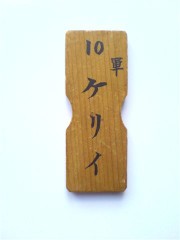
Name tag: "Terence Kelly" – Albert Ient had a similar one with his name on it.
What amazed Terence was that the Japanese seemed to be more concerned with counting the prisoners than their productivity within the dockyard. They were counted in and counted out of the yard. "I mean, there were a few Stakanovits who worked their heads off, but on the whole, if a Japanese could get out of work by scrounging, he would." Terence went on to say that after the war when he heard about the Kamikazes he was astonished: "I didn't believe it because of the way the Japanese had been in our dockyard."
Punishment
There was absolutely no hope of escaping from Innoshima Island and, as with all camps, the enforcement of rules and punishments depended very much on the camp commandant. Terence compared methods of punishment used in his camp with those the Nazis used to get information out of their prisoners and said:
"There wasn't anything like that, but you try kneeling on a thin piece of bamboo for a few hours, that's a pretty mean punishment. Not that I ever did. Other people got beaten up for misbehaving, that sort of thing. The Japanese were very free and handy with their fists and hands."
Terence felt that they had been quite fortunate with their camp commandant, who was regarded as quite a weak man, concerned only with himself and avoiding any trouble. Although a well-educated man, he did not hold a very high rank. Terence concluded that, "On the whole life could have been a whole lot worse than with Nimoto."
Malnutrition
All the prisoners suffered at different times from illness and disease, but in Hiroshima #5 they were lucky enough to have, according to Terence, "a marvellous man who became our camp doctor. A marvellous man named Mogford." Nevertheless, beriberi was a real problem for them: "As a prisoner of war, if you got beriberi then, as you sat down, your legs would swell up and you could stick your finger in and it would take half an hour for the indentation to come out." Even after the war had ended, the effects of beriberi were still clearly visible, especially when prisoners began to eat better food and they became bloated. As Terence was himself at the wedding of his friend Bill May where he acted as Best Man; a photograph taken on the day shows his face was, to use his words, "very sort of fat, that was the effect it has, but it gradually disappeared."
Prisoner of War Letters
Letters and a connection with home were naturally very important to the POWs. In Hiroshima #5, the prisoners did receive incoming post, handwritten letters and cards, but not for a very long time, not until a year and a half or perhaps two years of imprisonment has passed. When post did eventually get through, it came in batches and Terence received letters from his mother, stepfather and "one or two girlfriends". Outgoing correspondence usually took the form of cards on which prisoners were allowed to fill in certain words.[7] Terence remembered:
"You just had to fill it in. It said something like 'Please see that XX is taken care of.' and I put 'Peggy and Josephine are taken care of.' and my stupid stepfather showed the card to both girls! Well, one of them was married when I came back and the other was in South Africa. So, it was alright, it let me off the hook."
See Albert Ient's article for examples of these Japanese cards.
Red Cross Parcels
Terence could not remember representatives from the Red Cross visiting the camp, but Red Cross parcels were received quite early on. Unfortunately, there was only ever four or five consignments during the whole period of their imprisonment – three and a half years. Terence explained the system whereby one lot of parcels was held back and the remainder was distributed, the prisoners having to split the contents between them. This was because, "They [the camp managers] didn't want the Japanese people to know that we'd got food like sugar, only a little sugar by the way; there was no such thing as sugar in Japan. They only had what they grew themselves, they didn't import it."
Despite the rigors of prison life, humour in the camp was still very much alive. This "menu" was made up by Terence after receiving a Red Cross parcel in October 1944. This was probably the first for over two and a half years!
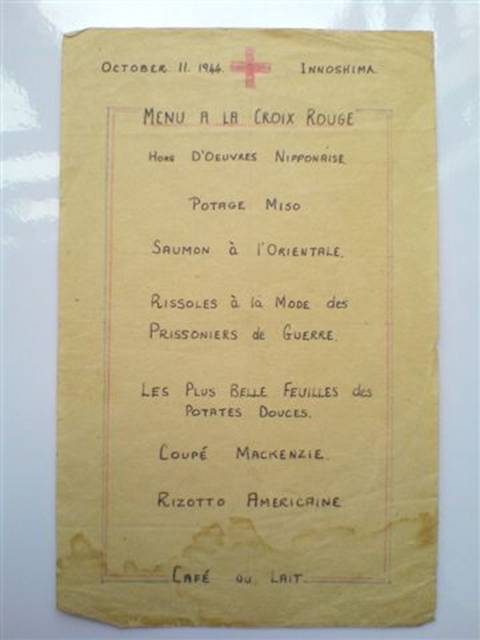
American Bombing
Bombing of the camp by the Americans started early in 1945 and the first attack Terence recalled involved, "a dozen aircraft, just strafing the camp." [8] B52s started to come over soon after that.
"We had this one particularly fearsome raid. They killed a lot of Japanese. They didn't kill any POWs – we were not in the camp but at the dockyard at that time. They sunk a submarine though and damaged the area quite badly.
"Later, in May that year, things took a more portentous turn. We saw these huge formations coming over. We couldn't count them. I always remember; some day in May, there was lots of cumulus cloud. Out of it appeared the nose of a B29 and then there was another one and another one and eventually you got a formation of 27 on each side. Then, as that came out, another formation of 27 making it a formation of 81, and eventually there were three or four hundred B29s and they just went straight overhead, thankfully. We heard them bombing somewhere else. I don't know where it was. But we were fortunate because records show that the Americans had decided to carry out complete pattern bombing, with these huge forces, of our dockyard on the 18th of August. That was three days AFTER the war ended!
"The dropping of the atom bomb had saved us! If they hadn't dropped the atom bomb they would have had to invade Japan. The first thing the Japanese would have done would have been to kill all the prisoners. They just wouldn't have been able to put up with us. The death toll for fighting the Japanese on both sides would have been absolutely horrendous. The Japanese wouldn't have carefully looked after their prisoners, they would have got rid of us, and so we were really lucky."
Atomic Bomb - Hiroshima
 Hiroshima, where they dropped the first atomic bomb on 6 August 1945, was only about 24 miles from the POW camp where Terence and Albert Ient were interned, and it was this distance and the fact that the terrain in between was hilly that prevented them from seeing what happened.
Hiroshima, where they dropped the first atomic bomb on 6 August 1945, was only about 24 miles from the POW camp where Terence and Albert Ient were interned, and it was this distance and the fact that the terrain in between was hilly that prevented them from seeing what happened.
Asked if he knew that the bomb had been dropped, Terence said"
"No, we didn't. We would have heard it but then we heard all these big formations which dropped all their bombs together and made horrendous sounds – a formation of 200 to 300 B29s dropped all their bombs on an area, and even if it was 30 miles away, we continually heard rattling. But we didn't know about the atom bomb. What was strange was that we obviously saw the aircraft which dropped it, because, curiously, on that very day when they dropped it, we were working in the dockyard and a single B29 came over.
"Yes, just one, most unusually, and if you draw a line from the airport where it took off, over Innoshima, it goes straight to Hiroshima. There's no doubt. We just looked up and saw it. It was eight in the morning, or something like that, and we just saw it come over and we thought 'That's very odd!' and carried on working. We no doubt heard the thing but we just thought it was another formation bombing from another direction. We didn't know about it until about ten days later."
Conditions Get Worse
Leading up to the end of the war, things in the camp had got a lot worse. The prisoners were very close to starvation and the Japanese themselves were not well fed. Terence felt that if the war had gone on the death toll would have suddenly become enormous, because there just was not any food. Rations had been severely cut, to the extent that they were "miniscule".
See also: Conditions and Routines in Hiroshima #5 PoW Camp on this website.
The End of the War
Neither the prisoners nor guards realised that the end of the war was going to come as quickly as it did. The prisoners continued to think that one day the Americans would invade. Terence recalled what actually happened:
"A few days after the atom bomb we were working as usual in the dockyard and we, that is the prisoners, were suddenly ordered to stop work and wait and all the other dockyard workers, the Japanese, were summoned to listen to a broadcast from Hirohito, which, of course, was extraordinary because he was never known to the public, he had never spoken to them, and he told them the war was over. Well, we were then told to go back to work. We had no idea what this broadcast was about and although I knew a bit of Japanese it wasn't good enough to translate it. While we were working on something or other, a Korean came up to me and said, 'The war's over.' and we thought it was all very odd, so we went on working.
"When lunchtime, if you could call it lunchtime, came we went to the canteen and I saw Freddie Clemo, who was this man who was marvellous at producing news and I said to him, 'The war's over.' and he said 'Nonsense!' So we went back to work and about half past four in the afternoon, or four o'clock, we were told to pack up work and return to the camp. So, we returned to the camp to find it temporarily empty of Japanese. It was all very odd and weird and then the Japanese came back and things went on more or less as usual. The usual thing in the evening was that Freddie Clemo used to come along the passage behind the windows on those photographs [photographs taken after the war of prisoners in front of their huts] to give the news. He was marvellous at getting the news. He stuck his head into my room, he looked at me, grinned, and said, 'You're quite right, the war is over but I wasn't going to be scooped!'
"Freddie Clemo was in a small working party of electricians, four of them, which had a Japanese foreman who was pro European who kept them informed and he had told them what the broadcast had said. On hearing the news, Terence sat down and wrote his reactions; he had just finished when the Camp Commandant, Mori, who had replaced Nimoto a month before, came into the hut and saw him. Mori took the paper –
"I thought, 'Oh, Lord!' and with that we got an air raid warning. I hadn't written anything terribly nasty about the Japanese as it happened. I had written about what I felt like. My reactions as it were. I thought as it was resolved [the war] I was safe to write. Then the all clear went and the Commandant came back in and handed me the piece of paper back. That was how we knew the war was really over. It was all very strange. It was very depressing, actually, because although there was a sense of glee, we thought what is the difference, this ghastly room, what are we going to do, what's going to happen? It took a lot of time to adjust to the war being over. We did, gradually, because we sort of took over the island. We didn't take it over in the sense of running everything but we had our own way. The Japanese, once the war was over, didn't seem bothered at losing it."
In fact, there were not many Japanese troops on the island. The camp had a permanent staff guard and a small batch of between six and ten soldiers who came for one month and were then replaced by another batch; there were sailors who came off ships; or if a troop ship came in then there would be a lot of army in the dockyard, but, by and large, the prisoners did not see large numbers of Japanese army personnel. When the war ended, the guards who had looked after the prisoners stayed in the camp, but as Terence says, "They made themselves as invisible and as small as possible."
During this gap of almost a month, the prisoners gradually organised themselves; a bomber plane came over and dropped Red Cross parcels and they were able to "blackball" the Japanese into giving them more food. Asked how they negotiated with the Japanese, Terence remembered with pride that this was something he felt he personally had to do:
"I decided something had to be done. Why me, I don't know, because I was only a youngster. Anyway, I did. I said to the Commandant, 'Look we've got to have a meeting for food.' so he said, 'Well, who do you want at the meeting?' I said, 'Well, we want you and we want the bank manager and we want the man in charge of food on the island and we want an interpreter.' Anyway, we had this meeting in the boardroom of Hitachi dockyard! I wasn't the only one. There was a sergeant from the Hong Kong group as well. He didn't say very much I remember, but he was there. And we sat at this table and I started to lay down the law as to what we should have.
"Well, first of all it was about food, and I asked for the most monstrous amount of rice. The men want it, I said, and if you don't give them what they want, they'll be over the wall looking for it and there will be trouble. And this was true, actually, there would have been. People were getting very restless in the camp. Wed won the war, for God's sake! So they agreed to these utterly ridiculous demands. I was enjoying myself. So then they said, 'Is there anything else?' and I said, 'Well, yes, we want some money!' They said, 'What do you want money for?' You see, you couldn't buy anything in Japan, there was nothing for sale. There was a shop we used to go by, but all it had in its window for sale was a hat! Anyway, I said, 'They want money, if they haven't got money, well then they'll be over the wall, breaking into shops and things.' So, then he said, 'Well, alright, so how much do you want?' So I said 200 yen a man. Well, as we got paid 15 yen a day for working, that's 1200 days' work. They said, 'So what are you going to do with 200 yen?' I said, 'That doesn't matter, that's what the men want and if they don't get it they'll be over the wall causing trouble.' So the Commandant said to me, 'Where do we get this money?' I said, 'Well, the bank manager has got plenty of money.' The bank manager resisted. He said 'I'm not giving you any money!' So we were at an impasse.
"Then the most astonishing thing happened. This Commandant said to me, 'If I advance the money, how will I know I'll get it back?' I said, 'Well, it's quite simple. You sign a short document saying in good faith that you have lent 30,000 yen and I will sign it that you have done so and when the first of the occupying troops arrive, you can present them with this and they will repay you.' He said, 'Will they?' and I said, 'Oh, yes!' So this Commandant wrote a cheque out for this very large sum of money, handed it to the bank manager, and the bank manager went off and we went on talking, and he came back with all this yen in a shoe box and I went back to the camp and I distributed 200 yen per man."
The British Navy Arrive in the Innoshima Sea
Terence's log notes that the war officially ended on 15 August, but it was sometime in September before the first Allied officer arrived.[9] As Terence related to me, and also as noted in his book, on Tuesday September 11 a small pinnace[10] came round the headland flying the White Ensign and shortly afterwards a British officer stepped ashore to tell them that they were all going home. With some amusement, Terence remembered that the officer said he couldn't stay long and boarded his boat again and disappeared again round the headland!
The short visit was, in fact, to give details of the PoW departure from the camp.
Returning Home – First Through Japan
Terence recalls:
"We got rid of most of the money when we got on the train to go to Yokohama – you've never seen a country like it, as we went through towns it looked like allotments, there was nothing left. It had been bombed and they had been wooden houses. There were children begging at the train as we went passed. They were very interested in the train and holding their hands out and we threw out all the money."
With a month to kill, people came up with all sorts of ideas to pass the time. One such idea was to collect the signatures of everybody in the camp as a sort of souvenir and Terence was able to show me a copy of this, with his and Albert's signatures clearly visible:
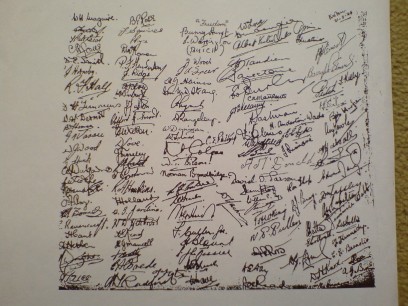
Albert Ient's signature is in the top right hand corner – the "Albert Victor" is quite distinct.
Journey from Japan to Australia
On the day of actual departure, 15 September according to Terence's log, a boat came and took the prisoners to Onomichi where they boarded a train to Osaka and HMS Ruler, a British aircraft carrier, which took then directly to Sydney, Australia:
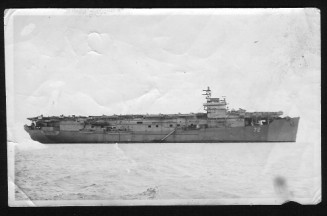
Thanks
I am deeply grateful for the opportunity to have spoken to Terence. The conversations we had ranged over many topics and provided me with factual and anecdotal evidence about life as a FEPOW that I would never had found elsewhere. And so, importantly for me, he answered the questions I wish I had asked my father, but never did.
[1] At the time of Terence's arrival, the camp was called Fukuoka 12. It was subsequently renamed Zentsuji 2 and later again renamed Hiroshima 5.
[2] T. Kelly has a copy of the diary Coxhead kept throughout this captivity in Hiroshima 5.
[3] Batavia, now known as Jakarta, is the capital and largest city of Indonesia, located on the northwest coast of the island of Java.
[4] Victor felt that it could be possible that Albert was the only member of the HK Royal Signal Regiment in this camp. Although Levett's War Diary claims that the third draft included six of his men.
[5] Kelly, T. By Hellship to Hiroshima, pp. 49-50
[6] Victor remembers playing with his father's bamboo tag when he was a boy. Unfortunately, it is now lost.
[7] Victor has the cards Albert sent to Toby during his internment at Hiroshima 5.
[8] Terence said that later he discovered that they came off the Indomitable, the British aircraft carrier which he had flown off.
[9] Date given in By Hellship to Hiroshima, p224, as 11 September 1945.
[10] A light boat used as a tender for merchant and war vessels
Previous page: Maynard Skinner - FEPOW
Next page: Harold Bates & Monty Truscott

